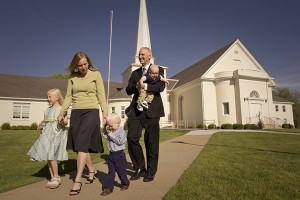My wife teaches math at one of the Church universities. Several times she has complained that she is puzzled and bothered by a practice of the students in her classes. More and more in the last few years, the students are treating their education like a menu. They are not in class to learn the principles of math they will need to succeed. Instead they are picking and choosing which concepts they will learn, and ignoring the rest, as though the concepts are optional and of no consequence if not mastered. Every semester, these same students are stunned to learn that they did not receive the grade they assumed they earned just by showing up each week. Often, even attendance is considered an optional activity by many students. Her comment to me recently was, “I don’t know where they learned this behavior. It certainly wasn’t in church!”
 That comment got me thinking. I understand that we all have our agency, our right to choose. But what effect does picking and choosing commandments have on us? Are we allowed to decide that we will obey commandment A and not commandment B? How much choice do we really have in the matter? Elder Russell M. Nelson (now president of the Church) refers to this menu approach as a “cafeteria approach.” In the April 2011 General Conference, he said this.
That comment got me thinking. I understand that we all have our agency, our right to choose. But what effect does picking and choosing commandments have on us? Are we allowed to decide that we will obey commandment A and not commandment B? How much choice do we really have in the matter? Elder Russell M. Nelson (now president of the Church) refers to this menu approach as a “cafeteria approach.” In the April 2011 General Conference, he said this.
“Warn them that they will encounter people who pick which commandments they will keep and ignore others that they choose to break. I call this the cafeteria approach to obedience. This practice of picking and choosing will not work. It will lead to misery. To prepare to meet God, one keeps all of His commandments” (Russell M. Nelson, “Face the Future With Faith,” April 2011).
Rules for Receiving Blessings
 To say that the gospel of Christ is a nice thought or general guideline is like saying the United States tax code is just a way of thinking. Both of these things are highly involved and very complicated. If we think the tax code is intricate, we haven’t even scratched the surface of the gospel. The gospel includes all the laws by which we will be judged in the end, how people will be assigned to kingdoms, which blessings are attached to which commandments, etc. The gospel includes everything having to do with the Atonement—who it covers and what we can achieve by using its power. There is no part of this earthly life that was not defined and exactly specified in the laws that make up the gospel and plan of salvation. We are told in the Doctrine and Covenants:
To say that the gospel of Christ is a nice thought or general guideline is like saying the United States tax code is just a way of thinking. Both of these things are highly involved and very complicated. If we think the tax code is intricate, we haven’t even scratched the surface of the gospel. The gospel includes all the laws by which we will be judged in the end, how people will be assigned to kingdoms, which blessings are attached to which commandments, etc. The gospel includes everything having to do with the Atonement—who it covers and what we can achieve by using its power. There is no part of this earthly life that was not defined and exactly specified in the laws that make up the gospel and plan of salvation. We are told in the Doctrine and Covenants:
“There is a law, irrevocably decreed in heaven before the foundations of this world, upon which all blessings are predicated—And when we obtain any blessing from God, it is by obedience to that law upon which it is predicated.” (D&C 130:20-21)
The wording says “any blessing,” not “a blessing.” Any and all blessings coming from God are based on obedience. That is probably why we are taught that obedience is the first law of heaven.
The Need for Faith
 When we do not trust that a blessing or punishment is attached to a law, we tend to not have any loyalty or devotion to that law. We can be persuaded to do something else. In order for us to be truly committed to obeying all of the commandments, we need to develop an abiding faith that gives us the strength to obey even when we face opposition and ridicule. We need this kind of faith. Elder Russell M. Nelson, in that same talk, also said,
When we do not trust that a blessing or punishment is attached to a law, we tend to not have any loyalty or devotion to that law. We can be persuaded to do something else. In order for us to be truly committed to obeying all of the commandments, we need to develop an abiding faith that gives us the strength to obey even when we face opposition and ridicule. We need this kind of faith. Elder Russell M. Nelson, in that same talk, also said,
Why do we need such resilient faith? Because difficult days are ahead. Rarely in the future will it be easy or popular to be a faithful Latter-day Saint. Each of us will be tested. The Apostle Paul warned that in the latter days, those who diligently follow the Lord “shall suffer persecution.” That very persecution can either crush you into silent weakness or motivate you to be more exemplary and courageous in your daily lives.
Lessons from the Savior
 Of course we have the agency to choose to live or not live any commandment we wish. What we tend to forget is that when we choose not to follow a commandment, we also choose the captivity that comes with that choice. The purpose of the commandments and why we need to live by them is that all commandments provide us with physical and spiritual liberty, allowing us to be free to make more choices in the future. Disobeying commandments always leads to a reduction in choices and eventual captivity that stops all spiritual progression. The Savior demonstrated for us that it is possible to choose to obey commandments. It really is something over which we have complete control. The late Elder Robert D. Hales said in the October 2010 General Conference:
Of course we have the agency to choose to live or not live any commandment we wish. What we tend to forget is that when we choose not to follow a commandment, we also choose the captivity that comes with that choice. The purpose of the commandments and why we need to live by them is that all commandments provide us with physical and spiritual liberty, allowing us to be free to make more choices in the future. Disobeying commandments always leads to a reduction in choices and eventual captivity that stops all spiritual progression. The Savior demonstrated for us that it is possible to choose to obey commandments. It really is something over which we have complete control. The late Elder Robert D. Hales said in the October 2010 General Conference:
To read more of Kelly Merrill’s articles, click here.
“Throughout His life our Savior showed us how to use our agency. As a boy in Jerusalem, He deliberately chose to ‘be about [His] Father’s business.’ In His ministry, He obediently chose ‘to do the will of [His] Father.’ In Gethsemane, He chose to suffer all things, saying, ‘Not my will, but thine, be done. And there appeared an angel unto him from heaven, strengthening him.’ On the cross, He chose to love His enemies, praying, ‘Father, forgive them; for they know not what they do.’ And then, so that He could finally demonstrate that He was choosing for Himself, He was left alone. ‘[Father,] why hast thou forsaken me?’ He asked. At last, He exercised His agency to act, enduring to the end, until He could say, ‘It is finished.’
Though He ‘was in all points tempted like as we are,’ with every choice and every action He exercised the agency to be our Savior—to break the chains of sin and death for us. And by His perfect life, He taught us that when we choose to do the will of our Heavenly Father, our agency is preserved, our opportunities increase, and we progress” (Robert D. Hales, “Agency: Essential to the Plan of Life” October 2010).
Conclusion
Agency grants us the ability to choose what we will and will not do, but agency also makes us responsible for those choices. The plan we fought for in heaven would allow us to either choose liberty and eternal life with God or captivity and damnation with Satan. That is what we fought for and that is what we are choosing between every day of our lives during mortality. To deliberately choose to ignore or violate certain commandments is just plain shortsighted. But then, who has ever accused us mortals of being particularly farsighted?
Kelly Merrill is semi retired and writes for https://gospelstudy.us. He lives with his wife in Idaho. His strength is being able to take difficult to understand subjects and break them down into understandable parts. He delights in writing about the gospel of Christ. Writing about the gospel is his personal missionary work to the members of the Church and to those of other faiths who are wanting to know more about Christ’s gospel and His Church.








You have a beautiful picture of the Boy Jesus in the Temple along with your article from Kelly Merrill. I’d like to use the picture as part of a lesson and want to give the artist credit. Would you please let me know who the author of that beautiful picture is? Thank you!
It’s called “Jesus Teaching the Elders in the Temple”, by Grant Romney Clawson. I got the image from LDS.org here https://www.lds.org/media-library/images/boy-jesus-in-the-temple-39538?lang=eng You’re welcome to use it.